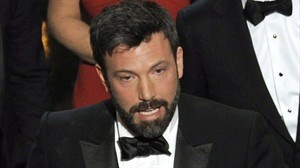
Director/producer Ben Affleck accepts the award for best picture for "Argo" during the Oscars at the Dolby Theatre on Sunday Feb. 24, 2013, in Los Angeles. THE CANADIAN PRESS/AP, Chris Pizzello/Invision
February 24, 2013 - 9:38 PM
Ben Affleck thanked Canada as "Argo" won the best-picture Oscar on Sunday night, just days after Canada's former ambassador to Iran suggested he do so.
Ken Taylor had said it would be appropriate for Affleck to mention Canada's role in the 1979 rescue of six U.S. embassy staffers that is depicted in "Argo."
Flanked by co-producer George Clooney, Affleck threw kudos to his fellow nominees, especially "Lincoln" director Steven Spielberg and the real-life CIA agent who inspired his film.
"Tony Mendez, who let us do his story, thank you," Affleck said after Michelle Obama announced the top prize.
"I thank everyone in the movie, on the movie, who worked on the movie, did anything with this movie," Affleck continued, as the star-studded crowd chuckled.
"I want to thank Canada, I want to thank our friends in Iran living in terrible circumstances right now. I want to thank my wife, who I don't normally associate with Iran."
Affleck's film — which had already won a slew of awards leading up to the Oscars — centres on Mendez and a Tinseltown scheme to concoct a fake movie project that would disguise the escapees as a Canadian film crew.
Taylor has been outspoken in his assertion that "Argo" minimizes Canada's role in spiriting the employees out of Iran in the midst of the hostage crisis.
Starring Canadian actor Victor Garber as Taylor, "Argo" says little about the ambassador's intricate role in concealing the fugitives and makes no mention of his efforts to persuade Ottawa to issue fake passports, arrange plane tickets and spy for the U.S. government — all while carrying on with his role as a diplomat.
It also completely ignores the role of Taylor's deputy, the recently deceased John Sheardown, who took the first call from escapee Bob Anders seeking refuge and also hid escapees in his home.
"Argo" screenwriter Chris Terrio, who won best adapted screenplay prize on Sunday night, also mentioned Taylor in his speech, after saluting Mendez.
"Thirty-three years ago Tony, using nothing but his creativity and his intelligence, got six people out of a very bad situation," said Terrio, who based his script on Mendez's book "The Master of Disguise" and a Wired magazine article by Joshuah Bearman.
"And so I want to dedicate this to him and the Taylors and the Sheardowns and people all over the world in the U.S., in Canada, in Iran, who use creativity and intelligence to solve problems non-violently."
During a recent talk with Ryerson University students, Taylor took issue with a myriad of creative liberties in "Argo," including the "black and white" portrayal of Iranian people, fabricated scenes and the suggestion that Taylor himself was little more than a meek observer to CIA heroics.
He summed it up by saying Terrio "had no idea" what he was talking about.
Former U.S. president Jimmy Carter has also taken aim at Affleck's film.
He called "Argo" a complete distortion when he accepted an honorary degree from Queen's University in November and followed that up with a CNN interview last week in which he said "90 per cent of the contributions to the ideas and the consummation of the plan was Canadian," but the film "gives almost full credit to the American CIA."
The controversy surrounding "Argo" dates back to September, when it debuted at the Toronto International Film Festival.
The original postscript of the movie said Taylor received 112 citations and awards for his work in freeing the employees and suggested Taylor didn't deserve them because the movie ends with the CIA deciding to let Canada have the credit for helping the Americans escape.
Affleck flew Taylor to Los Angeles after the Toronto debut and allowed him to insert a postscript that gave Canada some credit. Taylor called the initial postscript lines "disgraceful and insulting."
As criticisms continued to mount last week, Affleck called Taylor a "hero," and said he thought he'd addressed the former ambassador's concerns.
After the successful escape on Jan. 27, 1980, Taylor was widely hailed in both Canada and the United States.
"The release of the six done by another country ... sort of released a euphoria," Taylor recalled at his Ryerson talk.
"U.S. citizens responded in an extraordinary way — no Canadian paid for a drink for two weeks, (there were) free ski tow tickets, free bus tickets, police ignored parking tickets. There were some tangible benefits to this."
Taylor could not immediately be reached for comment Sunday night.
News from © The Canadian Press, 2013